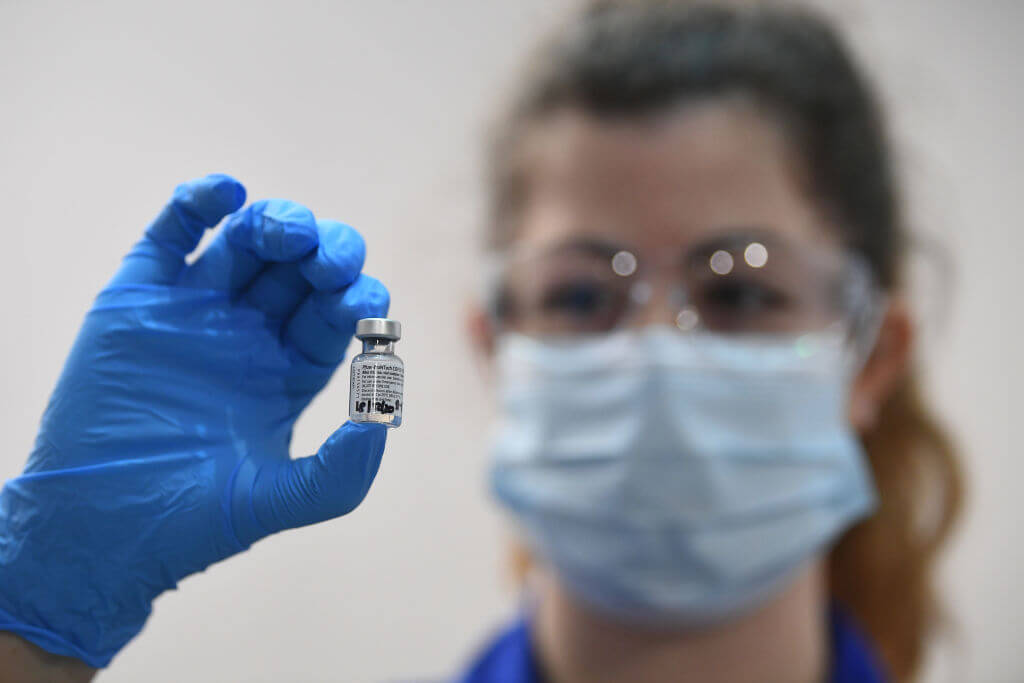
A member of medical staff holds a phial of the Pfizer/BioNTech Covid-19 vaccine jab at Guy's Hospital at the start of the largest ever immunisation programme in the UK's history on December 8, 2020 in London, United Kingdom. (Photo by Victoria Jones - Pool / Getty Images)
Pfizer says they have more than a million available doses, but zero direction on where to send them.
RICHMOND-Virginia will get 110,000 fewer vaccine doses than expected this month. The state’s health department made that announcement early Friday. The Commonwealth is one of several states that saw a sudden shift. Florida, Illinois, Maine and Washington State also made that list. But as for what’s causing the shortage? That depends on who you ask.
Pfizer says the problem isn’t theirs. Speaking with Dogwood on Friday morning, the company provided a detailed statement, saying they met every requested goal.
“Pfizer is not having any production issues with our COVID-19 vaccine, and no shipments containing the vaccine are on hold or delayed,” the statement says. “This week, we successfully shipped all 2.9 million doses that we were asked to ship by the U.S. Government to the locations specified by them.”
Pfizer officials added that they have more supplies ready to be delivered. But they need to know where to send them.
“We have millions more doses sitting in our warehouse but, as of now, we have not received any shipment instructions for additional doses,” the statement said.
Virginia Department of Health officials say they learned about the delays late Thursday. Originally the state was supposed to get 480,000 doses by Dec. 31. That’s what federal officials told VDH last week on an Operation Warp Speed call. The Trump administration set up OWS as a public-private partnership to handle manufacturing and distribution of the COVID-19 vaccine. However, on Dec. 17, OWS officials explained Virginia would get roughly 110,000 less doses than expected.
“Virginia is now planning to receive 370,650 doses of vaccine in December 2020 from two manufacturers, Pfizer and Moderna,” Health officials said in a statement. “Eighteen Virginia hospitals received initial shipments of the Pfizer vaccine this week, and they began dispersing a total of 72,125 doses to healthcare workers.”
RELATED: All Vaccines Have Side Effects. The COVID Vaccine Is No Different.
What’s Causing the Holdup?
Depending on who you ask, you get a different answer as to what’s causing the holdup. Speaking to CNBC Thursday, Health and Human Services Secretary Alex Azar blamed Pfizer. The company slashed its manufacturing projection for this year from 100 million doses to 50 million doses, Azar claimed. Azar added in the interview that he would “like to have more visibility” into Pfizer’s manufacturing capacity.
Pfizer officials said there shouldn’t have been any confusion. They walked federal officials through every part of the process, company officials say.
“We have continuously shared with Operation Warp Speed and the U.S. Department of Health and Human Services, through weekly meetings, every aspect of our production and distribution capabilities,” Pfizer officials said in their statement. “They have visited our facilities, walked the production lines and been updated on our production planning as information has become available.”
Company officials also pointed out that they made it clear back in November the U.S. should expect 50 million, not 100 million, doses this month. The evidence backs Pfizer up. The company even spelled it out in a Nov. 9 news release, which clearly states “we expect to produce globally up to 50 million vaccine doses in 2020 and up to 1.3 billion doses in 2021.”
Dogwood also reached out to the Centers for Disease Control and Prevention, but no one had responded by Friday night.
Phase One Will Take Longer
With only 370,650 doses coming this month, it’ll take longer to vaccinate everyone in the state’s Phase One plan. Phase One includes all healthcare workers, plus long-term care residents and staff members. Originally, the goal was to finish vaccinating all of Phase One by mid-January. Now it’s going to be a bit harder to hit that date.
Phase One covers 640,994 people. And it’s not as simple as giving one shot and then moving on. One shot won’t do the job. For both the Pfizer and Moderna vaccines, you need two shots. Pfizer’s version requires two shots, given 21 days apart. Moderna’s option, meanwhile, needs a second dose 28 days later.
Moderna’s vaccine is still waiting final approval. That’s expected to come later today, when a Federal Drug Administration panel reviews the proposal.
Brian Carlton is Dogwood’s managing editor. You can reach him at [email protected].

VIDEO: Check out Dogwood’s new merch line
Big news, Virginia! We've officially launched our Dogwood merch line 🎉 This year, we celebrate 5 years of bringing you Virginia news you can use....

VIDEO: Your support matters!
Your support matters! Donate today. @vadogwoodnews Your support matters! Visit our link in bio to donate today. #virginianews #virginia #community...

Op-Ed: Virginia’s new Democratic majorities pass key bills to improve your lives, but will Youngkin sign them?
The 2024 Virginia General Assembly regular session has wrapped up. It was a peculiar session from the outset, with Democratic majorities in the...

From the state rock to the state flower, here’s how Virginia got its symbols
Have you ever wondered why the Dogwood is the state flower? Or how the cardinal became the state bird? We’re here to answer those questions and more...

VIDEO: Second-gentleman Douglas Emhoff gives speech on reproductive freedom
Second gentleman, Douglas Emhoff touched on reproductive freedom not only being a woman's issue but "an everyone's issue" during the Biden-Harris...

Glenn Youngkin and the terrible, horrible, no good, very bad night
Election Day 2023 has come and gone, and while there are votes to be counted, one thing is perfectly clear: Virginians unequivocally rejected Gov....




